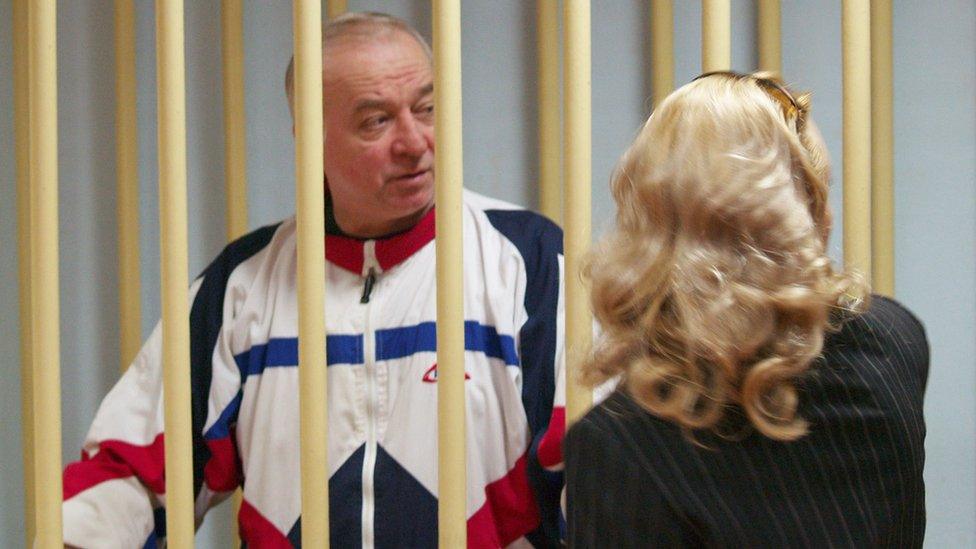Russian spy: Military deployed after poisoning
- Published
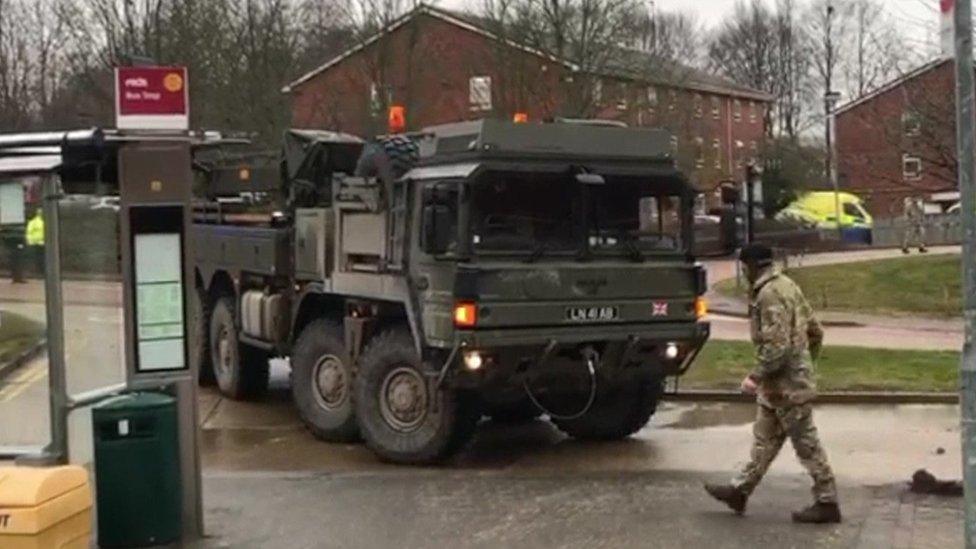
The military personnel are experts in chemical warfare and decontamination
About 180 military personnel have been deployed to Salisbury to help in the investigation into the attempted murder of an ex-Russian spy and his daughter.
The personnel - from the Army, Royal Marines and RAF - are experts in chemical warfare and decontamination.
Sergei Skripal and his daughter Yulia remain in a critical condition after being exposed to a nerve agent.
Home Secretary Amber Rudd will chair a meeting of the government's emergency committee, Cobra, on Saturday.
She has described Sunday's attack as "outrageous".
Those deployed include instructors from the Defence Chemical Biological Radiological and Nuclear Centre and the 29 Explosive Ordnance Group, who are experts in bomb disposal.
Eighteen vehicles have also been sent.
Members of the military were seen covering over a police car that has been at Salisbury Hospital since Sunday, before men dressed in white hazardous materials suits examined it.
It was later towed away from the hospital, covered by a tarpaulin, on the back of an Army truck.
Officers are also expected to secure Mr Skripal's car.
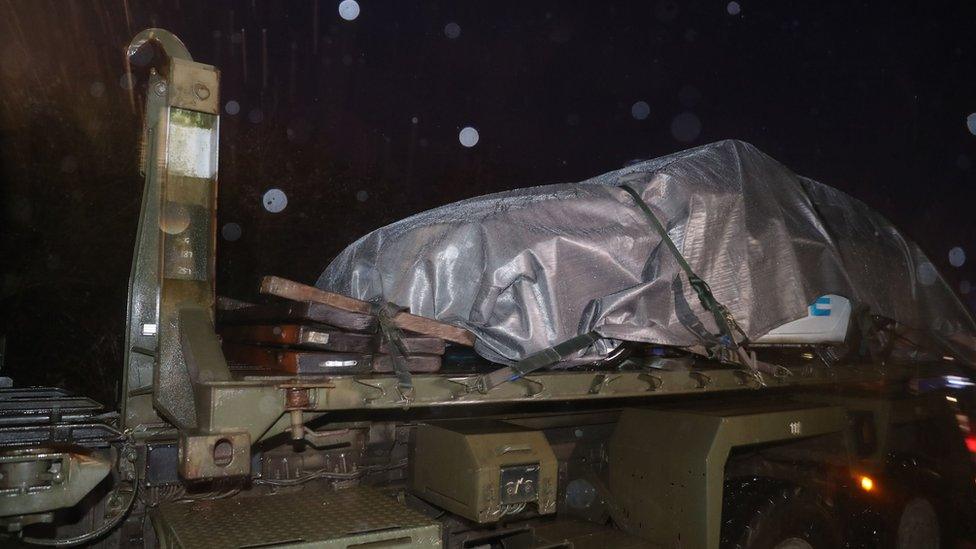
The police car was towed away from the hospital on an Army truck
Specialist officers have also put up a tent over the grave of Mr Skripal's son, who died last year, at Salisbury cemetery.
The Metropolitan Police said the counter-terrorism unit has requested the military's assistance "to remove a number of vehicles and objects from the scene", including ambulances that may have been contaminated while assisting the victims.
The public should not be alarmed and there is no evidence to suggest a wide public health risk at this time, the police added.
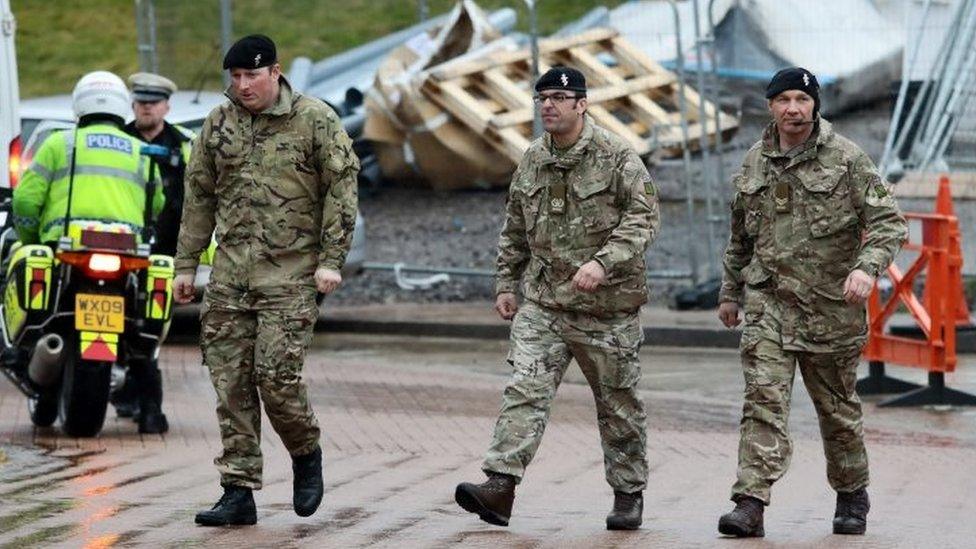
The military personnel in Salisbury are mostly from the Army, but also from the Royal Marines and RAF
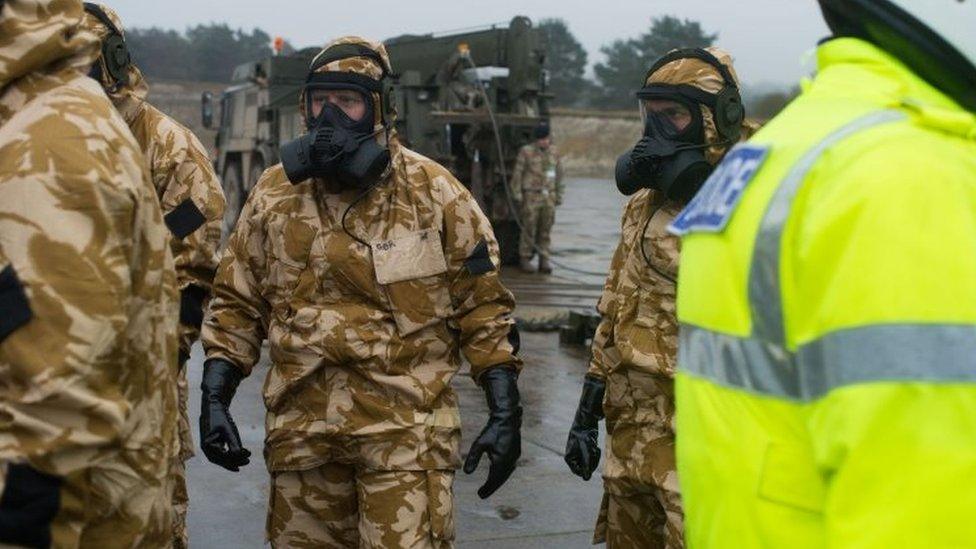
Military personnel were pictured making preparations at Winterbourne Gunner, Wiltshire, before deployment to Salisbury
Valery Morozov, a Russian exile, told BBC News that Mr Skripal was working in cyber security.
The former Russian military security colonel and his daughter remain in a critical condition at Salisbury District Hospital.
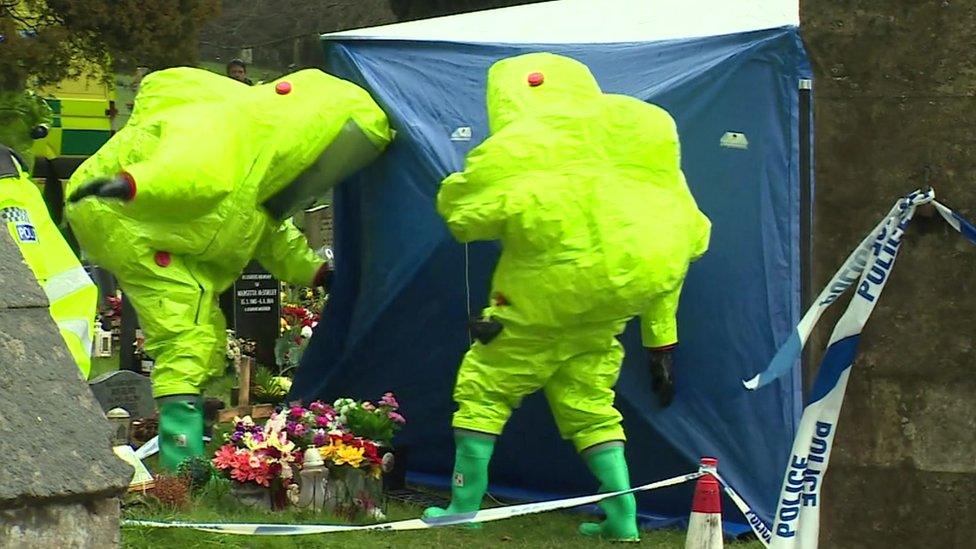
The graves of Mr Skripal's wife and son at a Salisbury cemetery have also been taped off
Det Sgt Nick Bailey - who attended the scene on Sunday - is conscious but "very anxious" about being exposed to a nerve agent.
Director of nursing Lorna Wilkinson said Mr Bailey was in a serious but stable condition.
Specialist investigators wearing protective suits have been seen examining the bench that Mr Skripal and his daughter collapsed on.
Mr Skripal's house and his car have also been cordoned off.
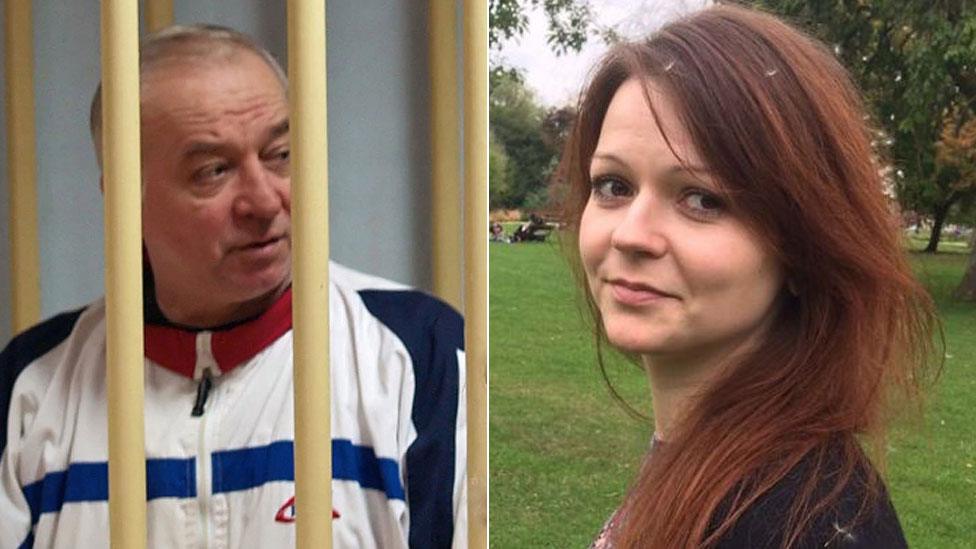
Former Russian military security colonel Sergei Skripal and his daughter Yulia were found unconscious in Salisbury on Sunday
It is known that Mr Skripal and his daughter had visited the Mill pub and Zizzi restaurant in Salisbury on Sunday afternoon, before they were found near the Maltings shopping centre.

Analysis
By Jonathan Beale, BBC defence correspondent
Some of the 180 military personnel who have been sent to help the investigation are specialists in chemical biological radiological and nuclear (CBRN) warfare.
They include Falcon Squadron from the Royal Tank Regiment, which uses specialist Fuchs vehicles - effectively mobile laboratories - to carry out tests and decontamination.
"Sensitive Site Exploitation" will look for any further traces of the nerve agent.
Royal Marines from 40 Commando have also just completed the UK's biggest chemical warfare exercise - called Toxic Dagger - involving 300 personnel and including scientists from Porton Down.
The existence of these units - some of which had suffered under defence cuts - highlights a growing concern in the military about the use of chemical weapons by individuals, terrorist groups and "rogue states".
But the public is being told not to be alarmed.
Many of the military personnel will be working behind the scenes and helping the police with relatively straightforward tasks, such as securing sites and removing objects, including ambulances, for decontamination.

Ms Rudd visited some of the sites cordoned off by counter-terrorism police in Salisbury on Friday.
She also visited Salisbury District Hospital where Mr Skripal, his daughter, and Mr Bailey are being treated.
The home secretary, who met Mr Bailey in hospital, would not give any further details of the nerve agent used or how it was administered.
Valery Morozov: "Skripal and Putin are both targets"
Mr Skripal, 66, was convicted by the Russian government of passing secrets to MI6, but given refuge in the UK in 2010 as part of a "spy swap".
Former Metropolitan Police Commissioner Lord Blair said the "extraordinary attack in Salisbury" is a good reason to investigate whether there is a pattern of former British intelligence collaborators dying in the UK.
Amber Rudd praises Salisbury police response
Former First Sea Lord and security minister Lord West said: "If it is a nation which has done it, it is completely unacceptable. It's almost like an act of war.
"To actually allow something like a nerve agent to be used in another country for some reason is outrageous."
Russian foreign minister Sergei Lavrov has denied his country's involvement in the attempted murder of the ex-spy.
BBC Rewind looks back at cases of high-profile Russians targeted on foreign soil
The attempted murder of Mr Skripal has drawn comparisons to the 2006 assassination of Alexander Litvinenko, who ingested the rare and highly radioactive Polonium 210 in London.
On Tuesday Labour MP Yvette Cooper asked the home secretary to review 14 other deaths that had not been treated as suspicious by UK police, but have reportedly been identified by US intelligence sources as being connected to the Russian state., external
Ms Rudd has refused to speculate on whether the Russian state might have been involved in the attack, saying the police investigation should be based on "facts, not rumour".

Do you have any information to share on this story? Email haveyoursay@bbc.co.uk, external.
Please include a contact number if you are willing to speak to a BBC journalist. You can also contact us in the following ways:
WhatsApp: +447555 173285
Tweet: @BBC_HaveYourSay, external
Send pictures/video to yourpics@bbc.co.uk, external
Send an SMS or MMS to 61124
- Published8 March 2018
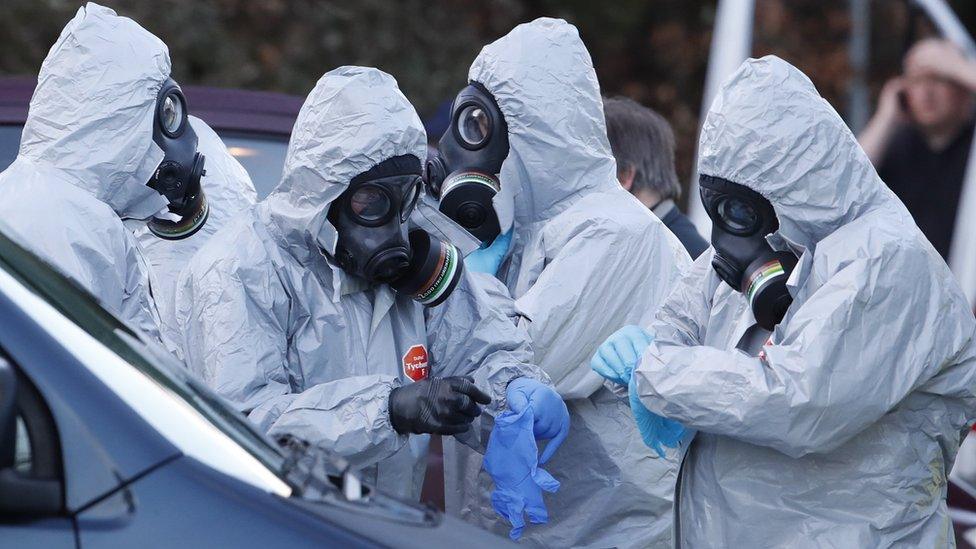
- Published8 October 2018
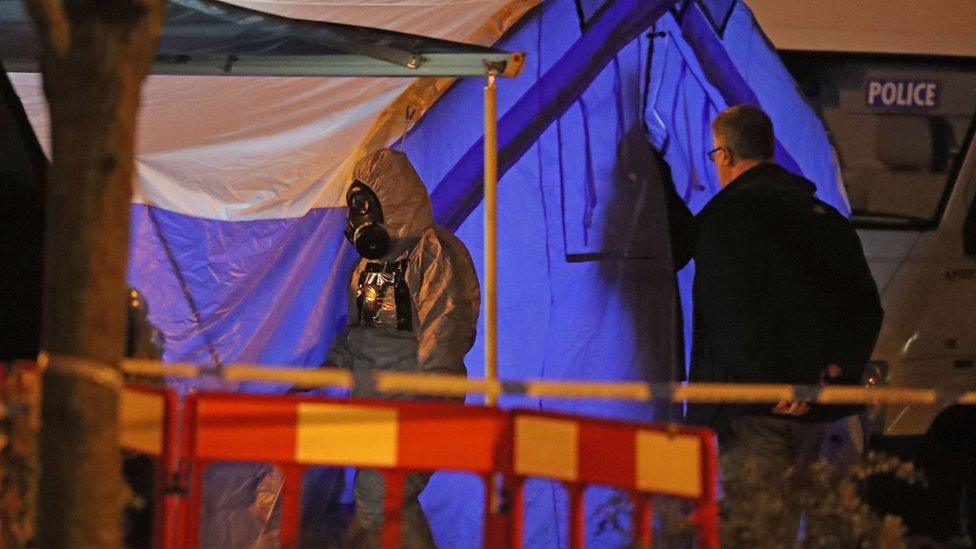
- Published7 March 2018
- Published29 March 2018
